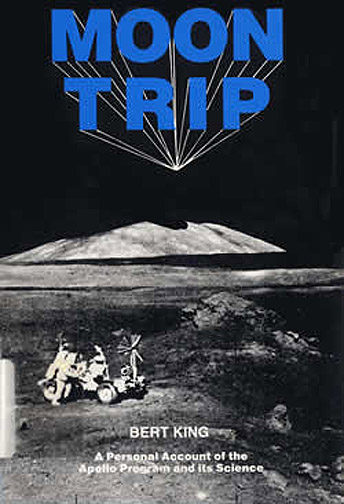Difference between revisions of "November 2, 2017"
(Created page with "__NOTOC__ =Another Gift From LPI= Originally published April 26, 2008 <!-- Start of content --> <!-- ws:start:WikiTextHeadingRule:0:<h1> --> <!-- ws:start:WikiTextL...") |
(No difference)
|
Latest revision as of 00:04, 2 November 2017
Another Gift From LPI
Originally published April 26, 2008

image of Bert King's Moon Trip, courtesy of LPI
Elbert King was the first curator of lunar samples at NASA's Johnson Space Center and one of the early JSC employees. He had many fascinating experiences in the early days of the space program and was intimately involved with the geologic training of the Apollo astronauts. In 1989 Bert published a small, little-known reminiscence of his life with NASA. called Moon Trip. Wonderfully, Mary Ann Hager and the staff at the Lunar & Planetary Institute have just added it to their growing list of online lunar books. You will want to read Moon Trip because it is an insider's honest account of how astronauts were trained, how lunar rocks were studied, and how much fun it was to be part of this historic enterprise. And you will also want to read it because it is such a delight! Bert was a wonderful story teller and he knew everyone to tell stories about. While you are at the LPI website downloading Bert's book, notice the other free Moon books LPI has published since the 1980s. These join the more than 75 year old books (beyond copyright) available elsewhere. We might ask what is being protected when books such as Ralph Baldwin's 1949 classic The Face of the Moon will remain unavailable online for another 26 years. If it were available now, neither its University of Chicago publisher nor Baldwin - who lives in Florida - would lose royalties, for the book has been out of print for decades. Science, history and society would benefit at no cost to the publisher - sounds like a great deal!
Chuck Wood
Note: Two days of books indicates a need for more great lunar images!
Yesterday's LPOD: Can We Do It Again?
Tomorrow's LPOD: Zapped by Earth?
COMMENTS
(1) Chuck--Has there been any discussion on the site about the composition of the lunar regolith and what can be learned from it, etc.? Or about studies of the rocks brought back by the Apollo astronauts? I did read something recently about how slight traces of water have been discovered in some of the Moon's rocks.
--Bill
(2) Bill - I would guess that 80% of all lunar science publications are about the rocks and regolith. LPOD doesn't usually cover these topics because they are not ones that amateurs can experiment with/image. You might reply that amateurs can't image lunar magnetic and gravity fields, or the farside, but LPOD sometimes features them. So maybe I will shown a lunar thin section sometime, but my interest doesn't extend to the details of lunar samples, except as they relate directly to processes that make the landforms we see. The recent detection of hyper-minute quantities of water doesn't lend itself to an LPOD because there is no picture to use. And it doesn't change the basic idea of the Moon's formation or evolution because there was apparently far too little retained water to make a difference. A Columbia University astrophysicist has suggested that the detection of water supports his theory that transient lunar events are caused by explosively escaping gases, including water. There was an LPOD on that because it is a topic amateurs have had an important involvement in.
--Chuck
COMMENTS?
Register, Log in, and join in the comments.



